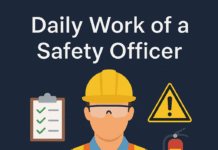
Safety Officer vs HSE Officer: What’s the Difference in 2025?
Introduction
In 2025, workplace safety is more than just a legal requirement—it’s a culture. But while job titles like Safety Officer and HSE Officer are often used interchangeably, they’re not quite the same. Confused about who does what? You’re not alone. Let’s break it down.
Who is a Safety Officer?
Definition and Key Responsibilities
A Safety Officer is a professional who ensures the workplace follows safety procedures. They’re on the ground, monitoring daily activities, conducting toolbox talks, inspecting equipment, and reporting unsafe conditions.
Core Industries
- Construction
- Warehousing
- Manufacturing
- Mining
Skills and Qualifications
- NEBOSH/IOSH certification
- Strong communication skills
- Good observation and attention to detail
- Experience with risk assessments and safety audits
Who is an HSE Officer?
Understanding HSE
HSE stands for Health, Safety, and Environment. An HSE Officer goes a step further by managing not just safety but also occupational health and environmental risks.
Roles and Responsibilities
- Designing HSE policies
- Conducting environmental audits
- Coordinating health programs
- Investigating incidents and implementing improvements
Industries They Work In
- Oil & Gas
- Pharmaceuticals
- Aviation
- Chemical plants
Major Differences Between Safety Officer and HSE Officer
1. Scope of Responsibilities
- Safety Officers focus solely on safety.
- HSE Officers deal with health, safety, and environmental factors.
2. Education & Certifications
- Safety Officers: NEBOSH IGC, OSHA 30
- HSE Officers: NEBOSH Diploma, ISO 14001 & ISO 45001 knowledge
3. Compliance Focus
- Safety: Basic safety regulations
- HSE: Advanced compliance with environmental and health standards
4. Reporting Structure
- Safety Officers usually report to site or project managers.
- HSE Officers may report to senior management or regional compliance heads.
Similarities Between Safety and HSE Officers
Both roles aim to prevent accidents, protect workers, and ensure legal compliance.
Shared Duties
- Conducting inspections
- Training workers
- Writing reports
- Investigating incidents
Career Path Comparison
Entry-Level Roles
- Safety Assistants
- Junior Safety Inspectors
Growth Potential
- Safety Officer → Senior Safety Officer → Safety Manager
- HSE Officer → HSE Engineer → HSE Manager → HSE Director
Salaries
Generally, HSE Officers earn slightly more, especially in multinational firms due to their broader scope.
Salary Comparison in 2025
| Position | Average Global Salary (USD) |
|---|---|
| Safety Officer | $45,000 – $65,000/year |
| HSE Officer | $55,000 – $80,000/year |
Regional Differences
- Middle East: High demand, especially in Oil & Gas
- Europe: Strong HSE culture with strict regulations
- Asia: Growing opportunities, especially in manufacturing
Certifications and Courses in 2025
Popular Courses
- Safety Officers: OSHA 30, IOSH Managing Safely, NEBOSH IGC
- HSE Officers: NEBOSH Diploma, ISO 14001, ISO 45001 Auditor
Learning Options
- Online platforms (Coursera, Udemy, HSEAcademy)
- In-person training from accredited institutes
Emerging Technologies
AI & IoT
- Real-time hazard alerts
- Predictive analytics for incident prevention
Digital Reporting
- Mobile apps for inspections
- Cloud-based safety dashboards
Virtual Reality
- VR-based hazard simulations for training workers safely
Regulatory Standards in 2025
- ISO 45001: Updated to include mental health aspects
- ISO 14001: Focus on climate-resilient policies
- Local Laws: Countries enforcing stricter compliance and fines
Work Environments
Common Sites
- Construction zones
- Oil rigs
- Labs & Hospitals
- Factories and plants
Pros and Cons
Safety Officer Pros
- Ground-level experience
- Easier entry into the field
Cons
- Limited scope
- Lesser pay compared to HSE roles
HSE Officer Pros
- Higher salary
- Broader knowledge base
Cons
- More responsibility
- Heavier regulatory load
Choosing the Right Career
Ask yourself:
- Do I want to focus purely on safety? → Safety Officer
- Am I interested in health and environmental management too? → HSE Officer
Follow your skills, interests, and long-term goals. Both roles offer meaningful and impactful careers.
Conclusion
So, Safety Officer or HSE Officer—what’s it going to be? In 2025, the lines are clearer than ever. Safety Officers focus on immediate, ground-level safety tasks, while HSE Officers take a broader approach, incorporating health and environmental concerns. If you’re aiming for a specialized and higher-paying career path, HSE might be your game. But if you want to start on the ground and build your way up, the Safety Officer route is a solid choice.
Work Permit Receiver vs Safety Officer: What’s the Difference?
Top Industries Hiring Work Permit Receivers in 2025
Roles and Duties of a Work Permit Receiver in Oil & Gas Projects
How to Become a Work Permit Receiver: Qualifications, Skills, and Responsibilities
Top-Paying Industries for Safety Engineers in 2025
FAQs
1. Can a Safety Officer become an HSE Officer?
Absolutely! With additional certifications in health and environmental management, career transition is possible.
2. Is HSE Officer a higher position than Safety Officer?
Generally, yes. HSE Officers have a broader scope and are considered more senior in many organizations.
3. What industries prefer HSE Officers over Safety Officers?
Industries with higher environmental risks—like Oil & Gas, Chemical, and Aviation—tend to prefer HSE roles.
4. Which job pays more in 2025?
HSE Officers typically earn more due to their expanded responsibilities.
5. Are online safety certifications accepted globally?
Yes, as long as they are from recognized institutions like NEBOSH, IOSH, or OSHA-authorized providers.
























